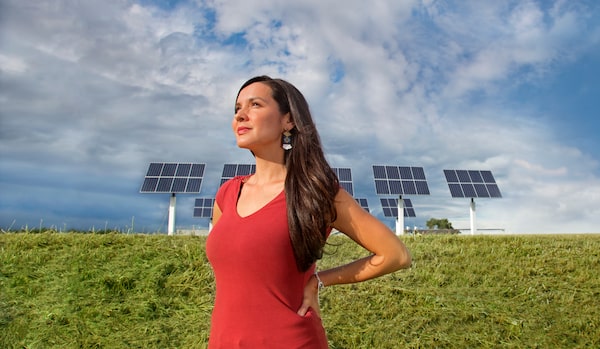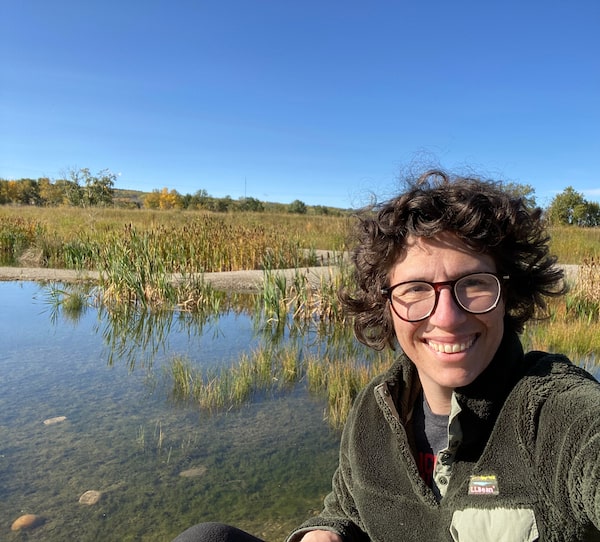From heat waves to floods and storms, the effects of climate change and the coverage around it can feel overwhelming. That hasn’t stopped these Canadians from making strides toward a sustainable future. We are sharing their stories during the COP26 Global Climate Conference, when leaders of more than 190 countries are meeting in an attempt to come to an agreement on the next steps for transitioning to a low-carbon economy.

Chef Charlotte Langley, co-founder of Scout, advocates for responsible seafood practices.Maria Bokhari/Handout
Charlotte Langley, co-founder of seafood cannery Scout
I’m the co-founder and the chief culinary officer at Scout, a North American craft seafood cannery. I lead the recipe and product development while advocating for responsible seafood practices as the official Canadian chef ambassador for the Marine Stewardship Council.
Scout is about much more than reviving the vanishing art of tinned seafood. We work with small-scale fishers, local canning partners and farms that share our interest in improving ocean health and cutting food waste, for a transparent supply chain. As a pending Certified B Corporation, we are committed to restoring responsibility in the seafood industry, while supporting climate action projects through 1% for the Planet.
My mantra is to be mindful of where your food comes from and how it is produced. Look for species from renewable populations, as well as a more diverse seafood diet. Include seaweeds, shellfish and mollusks. Find product certifications, like the MSC blue tick, that show it has been sourced from not-at-risk populations and with minimal impact on our marine ecosystems.

Melina Laboucan-Massimo, founder of Sacred Earth Solar and co-founder of Indigenous Climate Action, aims to put Indigenous communities at the forefront of the energy sector.Greg Miller/Handout
Melina Laboucan-Massimo, founder, Sacred Earth Solar
I am from the Cree Nation and was born in my community, Little Buffalo, in the heart of the Alberta tar sands. Before founding Sacred Earth Solar and co-founding Indigenous Climate Action, I advocated on the issues of Indigenous sovereignty, women’s rights, climate literacy and environmental justice for more than 15 years.
My work is currently focused on building a Just Transition, developing a framework for healing justice, and bringing solar power to Indigenous communities. As a part of my master’s thesis, the first renewable-energy project I implemented was a solar system that powers my community’s health centre.
A Just Transition places Indigenous communities at the forefront of the energy transition to ensure that our future energy system does not reproduce the imbalances and inequities of the current one.
To address the climate crisis, a global paradigm shift back to living within the natural laws of our Earth is essential.

Audrey Nelles, a biology student at McGill University, works to connect youth across Canada with sustainable initiatives.Handout
Audrey Nelles, student
I’m 20 years old and I’m a biology student at McGill University and an intern with the SOI Foundation. The SOI Foundation inspires and empowers leadership for a sustainable future by connecting youth to nature, and to the knowledge, people and resources to make a difference.
I work on the Foundation’s Blue Futures Pathways program, which connects youth across Canada with education, employment and funding to support them in developing successful careers in the sustainable blue economy. We’ve just launched our internship program, which provides education and stipends of up to $15,000 for youth seeking employment in the ocean and water sectors.
I know the kind of future I want to see for Canada. In order to slow climate change, Canada needs to prioritize healthy ecosystems, strong coastal communities, and recognition of Indigenous water rights. Supporting youth in building a sustainable future for our oceans and waterways is one of the most important things we can do to get there.

Naila Moloo, 15, is currently working on building transparent and flexible solar cells leveraging nanotechnology.Handout
Naila Moloo, student
I’m Naila Moloo, a 15-year-old based in Ottawa who is passionate about making an impact in the environmental sector. I’m currently working on building transparent and flexible solar cells leveraging nanotechnology, as well as a bioplastic made from duckweed through an internship at Pond Biomaterials.
After getting my debut novel published this year, I am intersecting my passions for writing and STEM through the development of a children’s book series on emerging technologies. I’ve realized during my journey that technological advancements are going to play an enormous role within sustainability, but we need more awareness.
There is a lot of negative coverage in the media about climate change, and while its effects are certainly detrimental, there is increasing innovation unfolding that many people are not aware of. From injecting carbon dioxide waste into concrete to replicating the mechanism that powers the sun and stars in a lab for clean fusion energy, very exciting things are coming.

Dr. Sara Hastings-Simon is an assistant professor in the Department of Physics and Astronomy, and the School of Public Policy, at the University of Calgary. Her work functions to build an understanding of how low-carbon energy transitions happen within different sectors.Handout
Dr. Sara Hastings-Simon, macro energy systems researcher
I’m an assistant professor in the Department of Physics and Astronomy, and the School of Public Policy, at the University of Calgary.
My research on macro energy systems draws from my experience in physics, business and policy to build an understanding of how low-carbon energy transitions happen within different sectors. I also look at how policy responses can improve outcomes to reduce emissions while creating economic opportunities.
I’m passionate about connecting research to practitioners and I’m a co-host of Energy vs Climate, a podcast that examines the energy transition and its impacts on Alberta and Canada. I previously founded Business Renewable Centre Canada, a not-for-profit that is accelerating large-scale renewable energy use across Canada by enabling corporations and institutions to buy renewable energy directly from developers.
I’m encouraged by the growing momentum for climate action and the expanding set of competitive low-carbon technologies. Policies are key in shaping markets and enabling individual action to reduce emissions, so one of the most important things we can do is support strong climate policies.

Shaelyn Wabegijig is a coordinator for the Kawartha World Issues Centre, where she works on sustainable development goals.Handout
Shaelyn Wabegijig
I’m a 24-year-old Trent University alumna, based in Nogojiwanong/Peterborough, the traditional territory of the Michi Saagiig First Nations. I’m Algonquin, German and Irish, and I grew up in Rama First Nation.
I’m a co-ordinator for the Kawartha World Issues Centre. From March, 2020, to this past March, I worked to advance the Sustainable Development Goals in Peterborough and the Kawarthas. I’m also one of seven youth, backed by Ecojustice, who are challenging the Ontario government’s inadequate climate targets. We say these threaten Ontarians’ rights to life, liberty and security of the person, and the lives of youth and future generations.
Doing this work, I find solace by grounding into my place in the world. I know what’s important to me, what I value and what I can change – so I focus on that and try to leave a positive impact. This has led me to work with many inspiring people who also care deeply about our environment and our shared future and are working every day to ensure we have one.
COP26 related reading
African leaders, hard-hit by climate change, plan a tougher stance at Glasgow negotiations
Compiled by Lacy Atalick